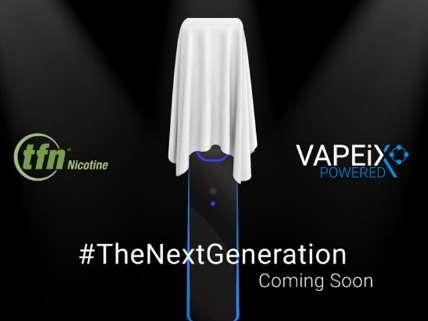The FDA Keeps Us Guessing About the Scope of Its E-Cigarette Regulations
Are nicotine-free e-liquids covered? Maybe. What about synthetic nicotine? Dunno.

Next Generation Labs, which makes synthetic nicotine for e-cigarettes, argues that a recent statement by the Food and Drug Administration shows the agency does not plan to regulate e-liquids as tobacco products unless they contain ingredients derived from tobacco. I don't think the statement shows anything of the kind, but I can't be sure. Like the FDA's other pronouncements on the subject of what is covered by its potentially ruinous e-cigarette regulations, the statement cheered by Next Generation Labs is hard to decipher.
Here is what the FDA said last month in response to Nicopure v. FDA, a lawsuit by a company that sells e-liquids and vaporizers:
Not all nicotine-free e-liquids (NFLs) are subject to the deeming rule. Assuming an NFL is not made or derived from tobacco, it is subject to the rule only if it meets the definition of a "component or part"—that is, if it is "intended or reasonably expected" either "(1) To alter or affect [a] tobacco product's performance, composition, constituents, or characteristics; or (2) To be used with or for the human consumption of a tobacco product; and is not an accessory."…An NFL that is intended or reasonably expected to be mixed with liquid nicotine would qualify as a "component or part."
The FDA is quoting from its own interpretation of the Family Smoking Prevention and Tobacco Control Act, the 2009 law that gave it authority over tobacco products. Since that law says a tobacco product must be "made or derived from tobacco," you might think it's obvious that an e-liquid is not a tobacco product if none of its ingredients is derived from tobacco. But the FDA says that e-liquid still might be a tobacco product because someone—a distributor, a retailer, or a consumer—could add nicotine to it later.
Even if the e-liquid never contains nicotine, it would seem to qualify as a "component or part" of a tobacco product if it is consumed in a vaporizer that also can be used to inhale nicotine. By the FDA's reasoning, that vaporizer is a component of a tobacco product, meaning it is itself a tobacco product. Hence any e-liquid used with that vaporizer, whether or not it contains nicotine or any other tobacco derivative, is also component of a tobacco product.
As far as I know, the FDA has neither endorsed nor rejected this understanding of the law, despite many opportunities to do so. But the interpretation is consistent with the agency's broad view of its authority under the Tobacco Control Act. Assuming the FDA reads the law this way, an e-liquid could escape regulation as a tobacco product only if it was part of a closed system that was incompatible with e-liquids containing nicotine. If a company specializing in nicotine-free liquids packaged them in cartridges that could be used only in that company's e-cigarette, the liquids presumably could not be considered components of a tobacco product. That approach would also avoid the possibility that nicotine added to the e-liquids by someone other than the manufacturer would retroactively transform them into tobacco products, as suggested by the FDA in its Nicopure brief.
What does all this mean for e-liquids that contain synthetic nicotine? The possibility that someone would add tobacco-derived nicotine to them seems remote, so Next Generation Labs needn't worry about that (I think). But e-liquids containing its TFN-brand nicotine could still be deemed tobacco products if they work with multipurpose vaporizers. The company is therefore collaborating with Vapeix to develop a "cloud-connected smart vaporizer platform" that works only with e-liquids containing TFN nicotine. Next Generation cofounder Ron Tully says the alliance aims to "create a vape market which is unequivocally disassociated from traditional vaping devices that are intended to be used with tobacco-derived nicotine."
Legally, it seems like that strategy could work. But I can't see how the FDA statement cited by Tully's company, which addresses (or avoids addressing) nicotine-free e-fluids and is similar to maddeningly vague statements the agency has made before, makes the project any more promising.


Show Comments (20)